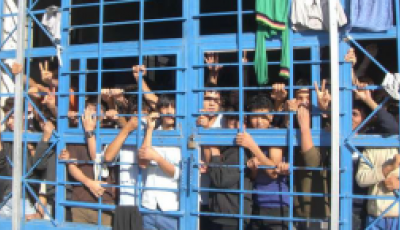Post by Andriani Fili, Research Associate, Centre for Criminology, University of Oxford. Andriani has been involved in a variety of research projects in Greece and as a practitioner she has been managing EU programmes on the provision of support services to refugees and migrants in detention.
Irregular entry into Europe has increasingly occurred across the Greek-Turkish border. Characterised as one of Europe’s deadly borders, the crossing from Greece to Turkey, especially through the islands of the Eastern Aegean, has recently witnessed a dramatic upsurge, making 2014 a record year. Among the new arrivals, and with increasing frequency, are children who arrive in Greece unaccompanied by a parent or a caregiver.

The only primary data are those provided by the Ministry of Public Order and Citizen Protection and the Ministry of Labour, reflecting the number of unaccompanied minors who have been arrested at the border and those who have lodged an asylum application, as well as the number of minors who have been allocated to reception centres. More specifically, in 2013, 3,122 unaccompanied minors were arrested by the police, 453 applied for asylum, and 1,150 were placed in safe accommodation centres. Reflecting the rise in numbers of new arrivals, in 2014 there have been 2,004 housing requests so far, 349 of which haven't yet been satisfied. The data on hand indicate that unaccompanied minors mainly originate from countries experiencing armed conflict, oppression or abuses of human rights, or the collapse of social structures due to the coexistence of conflict and poverty, like Afghanistan and lately Syria. According to the National Centre for Social Solidarity, the vast majority are boys between 15 to 18 years of age, but there's also a small proportion (around 3%) of girls. The statistical representation of minors who do not enter the asylum procedure is at all times obscure, rendering a large number of them, who consider Greece a transit station, invisible to the authorities.
The existing framework for the protection of minors in Greece, both in terms of legislative provisions and in practice, is inadequate to address the special needs of third country national children who arrive in Greece alone. Their vulnerability should be viewed in context of the Greek reality, namely the deficiencies of the asylum procedure, the limitations of the country’s welfare system and human trafficking issues.
The enactment of Law 3907/2011 foreseeing the establishment of a First Reception Service and a New (civil) Asylum Service signals a new era in Greek migration policy in two ways. On the one hand, the establishment of the First Reception Service sets first reception and screening procedures as the cornerstone of migration management, allowing for the identification and profiling of needs of persons entering (e.g., asylum seekers, vulnerable persons with special needs, etc.) in order to allow for further treatment depending on the case. On the other hand, the commencement of the newly established civil New Asylum Service on 7 June 2013, coinciding with the cessation of the registration of asylum claims by the Greek Police, seems to have extended access not only to asylum, but also to other services of support, through the gradual establishment of a referral mechanism, between the Asylum Service and civil society organisations. Nevertheless, even though Greece has dealt with some of the many shortcomings of its migration management and with the economic crisis as the background, the conditions concerning access of minors to asylum, especially at points of entry, remain unclear and differ in any given period of time.
When in Greece, minors don't receive differentiated treatment as there's no specialised state infrastructure for receiving and dealing with these children and no staff professionally qualified to examine their claims. Furthermore, there are no specific provisions for their detention. Administrative detention of children in adult detention centres offers neither appropriate material conditions nor a supporting and caring environment. As in other cases, their deprivation of liberty is administered on the same legal basis as that of adults who have irregularly entered the country. Increased attention to the issue the past years has led, paradoxically, to lengthier periods of detention for minors since the authorities don't release them until a placement in appropriate reception facilities is found. Afraid to suffer more days in detention and having being deterred from registering as minors, unaccompanied minors upon arrival to Greece often declare themselves as adults.

Who is responsible for them?
Greek legislation, with Presidential Decree (P.D.) 61/1999, provides for the appointment of the Public Prosecutor as a temporary guardian. However, in practice, the operation of guardianship for minors has very rarely been effectively activated, rendering unaccompanied and separated children in further danger. This situation is often attributed to prosecutors’ overwhelming workload. What is more, the adoption of P.D. 220/2007, foresees that the Public Prosecutor, ‘who acts as a temporary guardian of the minors … takes the necessary steps for the appointment of a guardian of the minor.’ All the same, this has often been misinterpreted, as if the only role of the temporary guardian is to find a permanent guardian. In practice, Public Prosecutors delegate the responsibility for the care and protection of minors to managers or social workers of reception centres, often without officially informing them. These facilities are neither equipped nor adequately staffed to cover this gap. Thus, in reality, according to a recent European Committee for the Prevention of Torture report, there's absolutely no contact between the guardian and the child, who is merely left in limbo awaiting a decision at some point on his or her future.
As the daily acts that require the consent of a guardian are numerous, the absence of an effective guardian, be it temporary or permanent, has implications for all aspects of the protection and exercise of unaccompanied minors' lawful rights. It's also an obstacle to their integration into Greek society, impeding access to basic social goods such as housing, healthcare, and education. Forced to fend for themselves, children struggle daily for survival. As a result, children are repeatedly exposed to trafficking and exploitation networks, more apparent in their repeated attempts to reach another European country irregularly. Unaccompanied children who have not filed an asylum application, who have fallen out of the asylum system, or who have had their applications denied, have no regular status while in Greece. As such, they are subject to repeated detention. Despite the above, the state seems to be unaware of the importance of filling this legal and practical vacuum, replicating a system of entrenched social inequalities.
At the moment, there is no effective infrastructure or institution responsible for the care of unaccompanied and separated children in Greece and the authorities, who are unwilling or unable to play this role, wash their hands of it by relocating their responsibilities to other agencies and institutions. To ensure that competent services are staffed with specialized personnel, political will and financial commitment are required, both of which are lacking in Greece these days.
Any comments about this post? Get in touch with us! Send us an email, or post a comment here or on Facebook. You can also tweet us.
__________
How to cite this blog post (Harvard style):
Fili A (2014) Unaccompanied Minors in Greece: Passing on the Responsibility. Available at: http://bordercriminologies.law.ox.ac.uk/unaccompanied-minors-in-greece/ (Accessed [date]).
Share:








